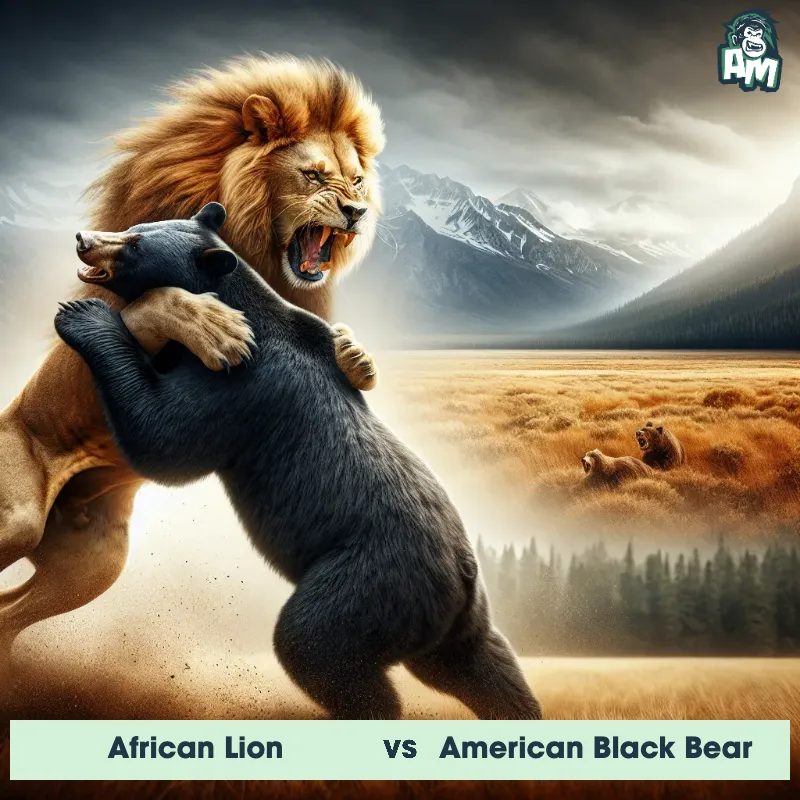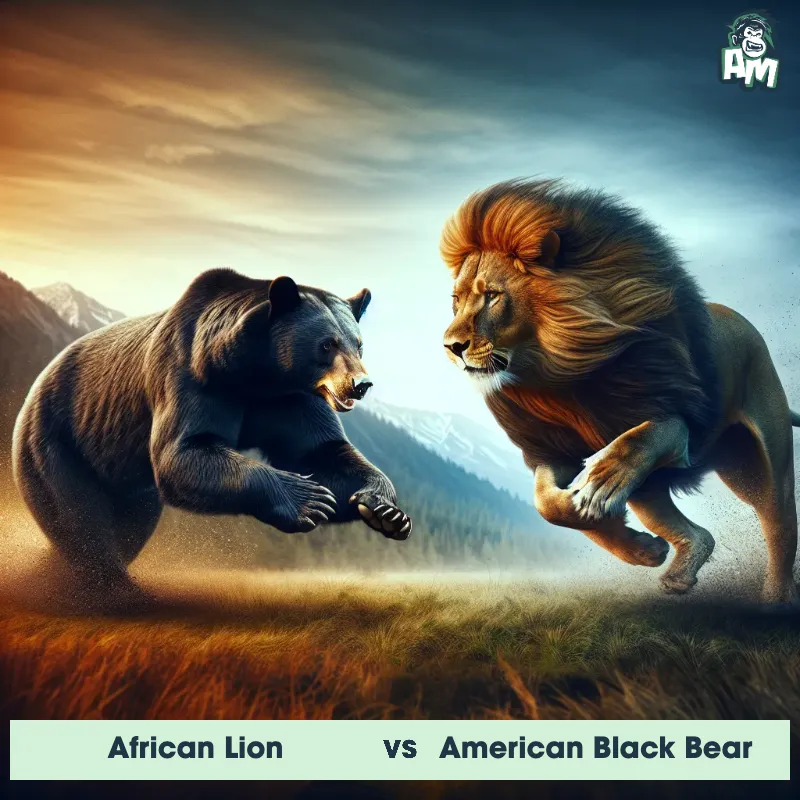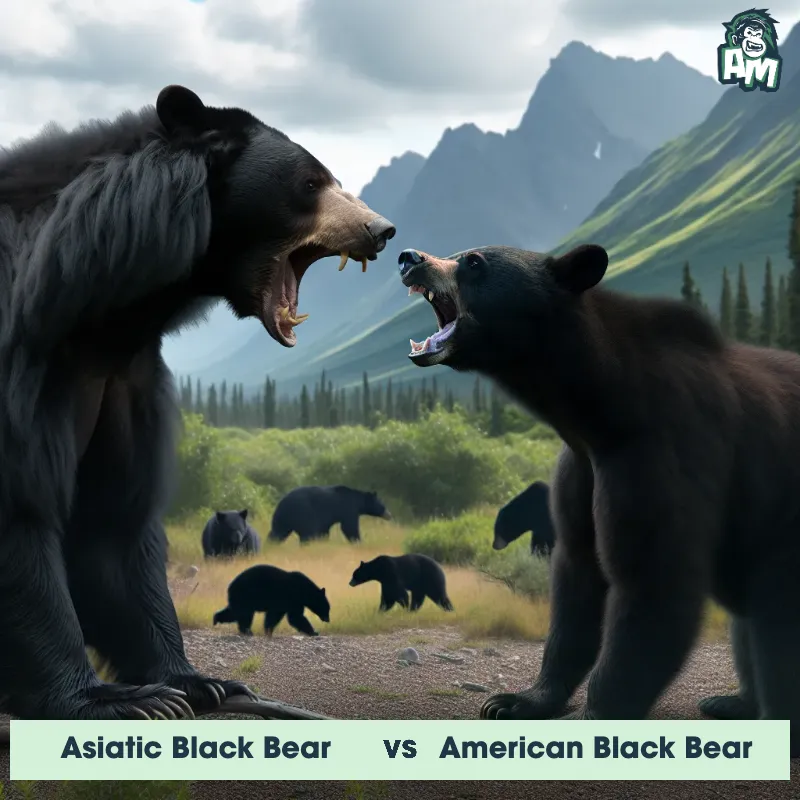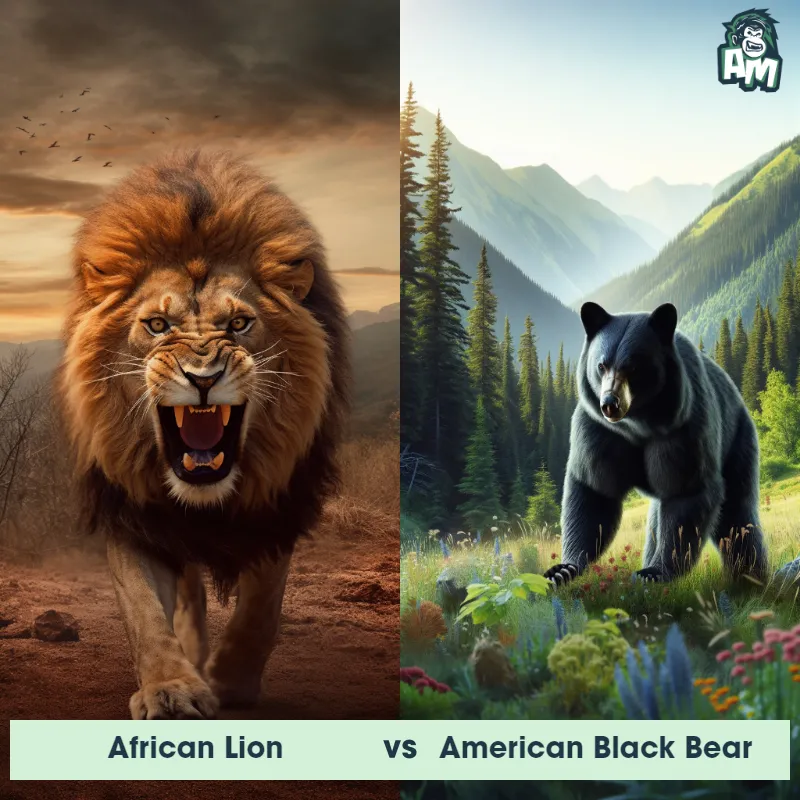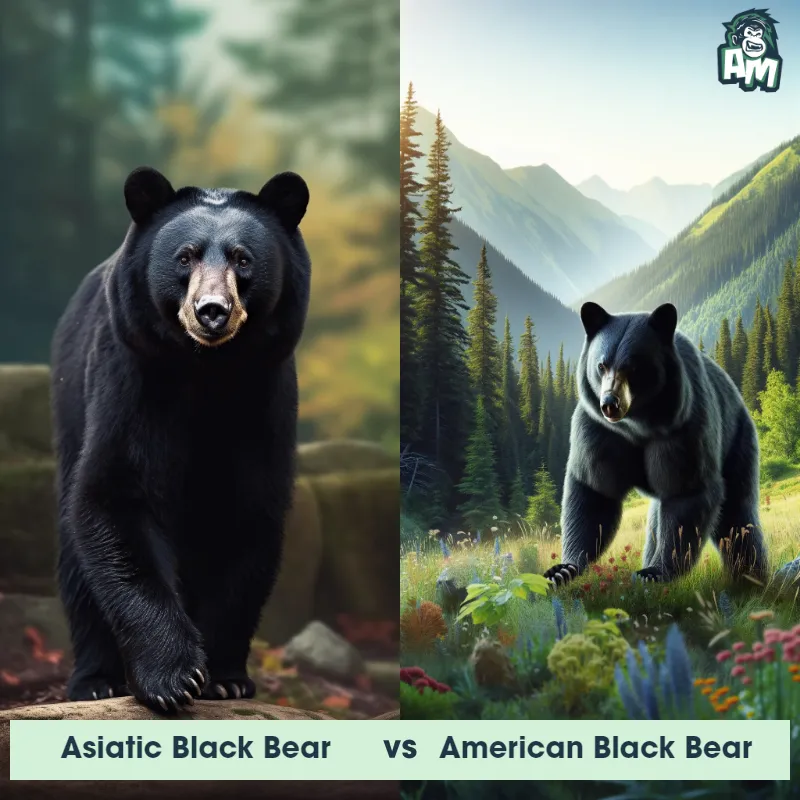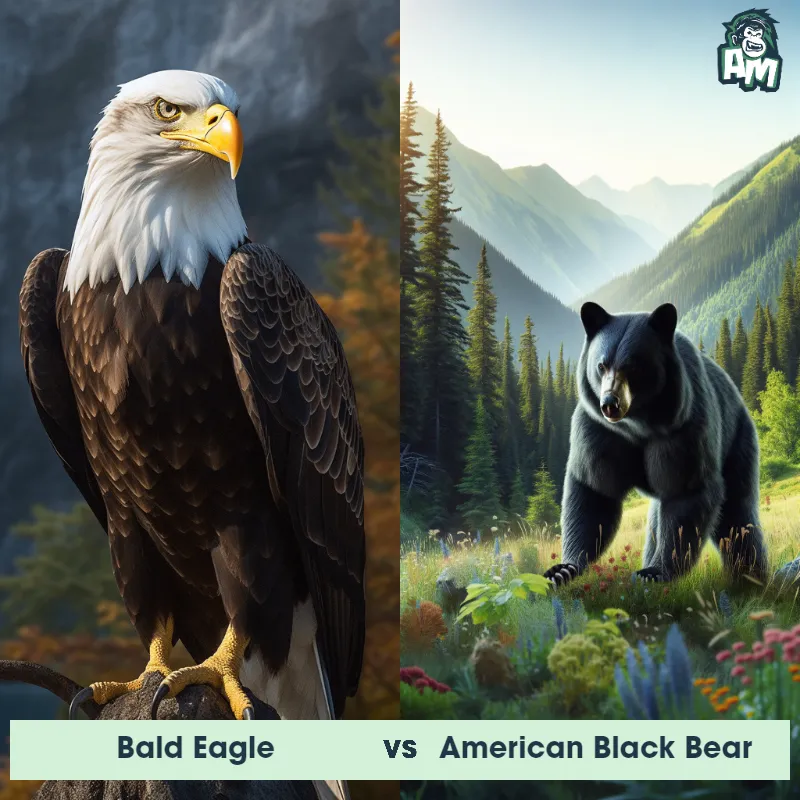The American Black Bear
The American Black Bear is a medium-sized bear species found throughout North America. They have a distinctive black or dark brown fur, although some individuals may have lighter colored fur. Known for their adaptability, American Black Bears have a stocky build with a hump on their shoulders, long claws, and a short tail. They are omnivorous, feeding on a varied diet that includes berries, nuts, insects, fish, and occasionally small mammals.
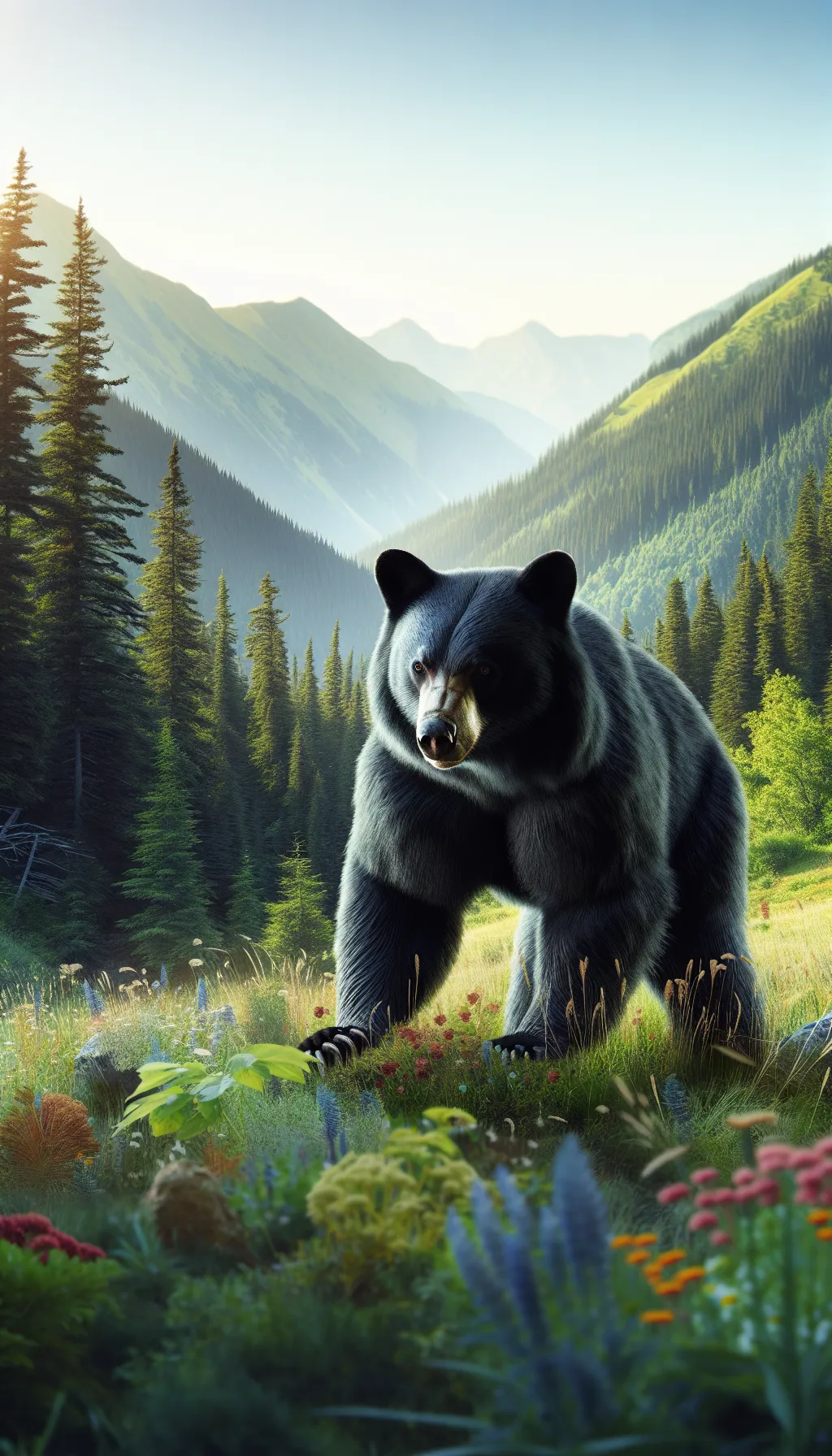
| American Black Bear | |
|---|---|
| Size | 4-7 feet (1.2-2.1 meters) |
| Weight | 200-600 pounds (91-272 kilograms) |
| Speed | 25-30 mph (40-48 km/h) |
| Key Strength | Powerful forelimbs and jaws |
| Biggest Weakness | Vulnerable abdomen |
| Scientific Name | Ursus americanus |
| Family | Ursidae |
| Habitat | Forests, mountains, swamps, and other wooded areas |
| Geography | North America |
| Diet | Omnivorous - plants, berries, nuts, insects, fish, small mammals, and occasionally carrion |
| Lifespan | 15 years - 30 years |

The American Black Bear
The American Black Bear is a medium-sized bear species found throughout North America. They have a distinctive black or dark brown fur, although some individuals may have lighter colored fur. Known for their adaptability, American Black Bears have a stocky build with a hump on their shoulders, long claws, and a short tail. They are omnivorous, feeding on a varied diet that includes berries, nuts, insects, fish, and occasionally small mammals.
Fun Fact: Despite their name, not all American Black Bears are actually black. Some individuals can have a cinnamon, brown, or even a bluish-gray coloration.
| American Black Bear | |
|---|---|
| Size | 4-7 feet (1.2-2.1 meters) |
| Weight | 200-600 pounds (91-272 kilograms) |
| Speed | 25-30 mph (40-48 km/h) |
| Key Strength | Powerful forelimbs and jaws |
| Biggest Weakness | Vulnerable abdomen |
| Scientific Name | Ursus americanus |
| Family | Ursidae |
| Habitat | Forests, mountains, swamps, and other wooded areas |
| Geography | North America |
| Diet | Omnivorous - plants, berries, nuts, insects, fish, small mammals, and occasionally carrion |
| Lifespan | 15 years - 30 years |
Match Highlights
American Black Bear Matchups
We use AI to simulate matchups between the American Black Bear and other animals. Our simulation considers size, strength, and natural predatory behaviors to determine the most likely outcome.
American Black Bear: Diet, Predators, Aggression, and Defensive Behaviors
What do American Black Bears eat?
American Black Bears are omnivores, meaning they eat a wide variety of foods. Their diet consists of plants, fruits, nuts, insects, small mammals, fish, and sometimes carrion. They are opportunistic feeders and will consume whatever is most readily available in their environment.
Do American Black Bears have any predators?
While American Black Bears do not have many natural predators, they can sometimes fall victim to larger predators such as mountain lions, wolves, and occasionally humans. However, adult black bears are usually top predators in their habitats.
Are American Black Bears aggressive?
American Black Bears are typically shy and non-aggressive towards humans. They will usually avoid confrontations if possible. However, they may become aggressive if they feel threatened or are defending their cubs or food sources.
Do American Black Bears fight?
American Black Bears may engage in fights with each other during mating season or when competing for food sources. These fights usually involve swatting, grappling, and vocalizations rather than serious physical harm.
How do American Black Bears defend themselves?
When feeling threatened, American Black Bears may defend themselves by standing on their hind legs to appear larger, making loud noises, swatting with their paws, or charging. They may also bluff charge to scare away potential threats without actually making physical contact.
What is the biggest weakness of American Black Bears in a fight?
Despite their size and strength, the biggest weakness of American Black Bears in a fight is their vulnerability to sustained attacks. While they can defend themselves effectively in short bursts, they may struggle to fend off continuous aggression from a more powerful predator or human. Additionally, their instinct to retreat rather than fight to the death can also be a weakness in certain situations.
Fun Fact: American Black Bears are excellent climbers and are often seen scaling trees to forage for food, escape predators, or just rest comfortably on branches.
Fun Fact: American Black Bears are capable of running at speeds of up to 35 miles per hour, making them faster than humans and many other animals, despite their seemingly bulky appearance.



